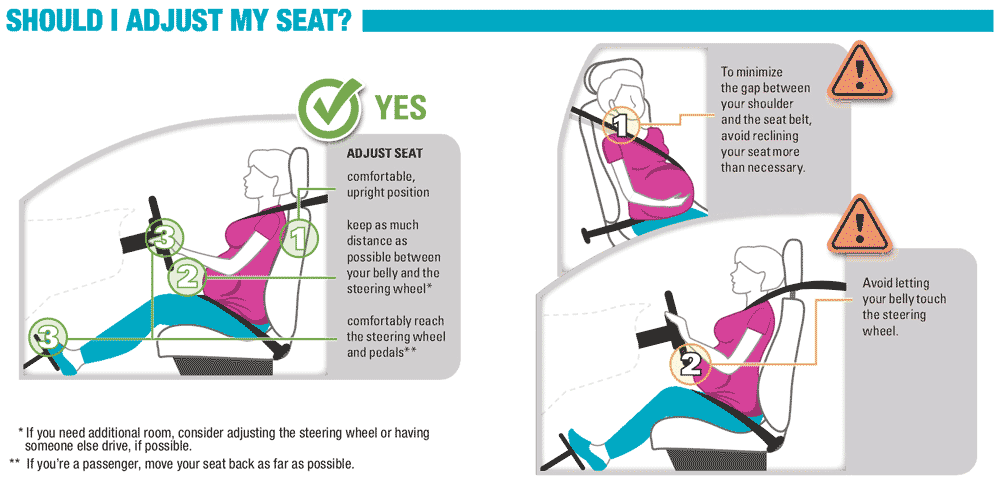After falling pregnant, you find out there is a long list of things that you are now prohibited from doing and eating. Mothers worry about taking hot baths, eating the wrong types of cheese and the dangers of flying.

Interestingly, mothers very rarely consider the dangers of road safety. Is it safe to drive while pregnant and what do you need to beware of while on the road?
In the United States alone 170 000 pregnant women are involved in car accidents every year. Sadly, it is estimated that 3000 pregnancies are lost as a result of these crashes every year.
That is 39 times the number of infants killed in car crashes every year and 86 times the number of children lost in hot car deaths.
So, Is it safe to drive while pregnant?
Most experts agree that it is perfectly fine to continue driving while pregnant, provided that you have a healthy pregnancy.
While this may be true, there are safety aspects to consider.
A large study in the Canadian Medical Association Journal on more than 500 000 mothers has found that expectant mothers are more likely to have serious car crashes.
The risk emerges in the 2nd trimester when the car crash rate among the women studied rose by 42%. During this period, the rate of ER visits because of traffic accident rose from 4.3 visits per 1000 women to 7.7 visits per 1000 women.
In spite of these findings, the study maintains that it is still safe to drive throughout your pregnancy but advises that you pay more attention while driving pregnant and are especially careful during the second trimester. Every crash in the study could most likely have been avoided by a small change in driver behaviour.
In the third trimester, you might want to stop driving from a comfort point of view but from a safety point of view the risk of having an accident drops off again in the third trimester.
Do I have to wear a seat belt if I’m pregnant?
YES! The increased rate of accidents while pregnant emphasises the fact that you should always be wearing your seat belt when in a car.

Studies show that buckling up through all stages of your pregnancy is the single most effective action you can take to protect yourself and your unborn child in a crash.
Mothers who wore a shoulder and lap belt were 4.5 times more likely to have an acceptable fetal outcome in a crash than mothers who did not.
Can the seat belt hurt my unborn baby?
It all depends on how the seat belt is being worn. A properly worn seat belt does not pose a threat to your pregnancy and improves the outcome for you and your baby in the case of an accident.
An incorrectly worn seat belt, however, can pose a very real danger to your pregnancy and unborn baby.
How should I wear MY seatbelt while pregnant?
For your baby to remain safe, the correct positioning of the seat belt is critical.
A 2008 study on pregnant women in crashes estimated that if proper belt use among pregnant women went from 80% to 100%, It would reduce the number of fetal deaths in crashes by 50%.

Image courtesy of the NHTSA.
The correct way to wear your seat belt is to position the shoulder belt on the shoulder and away from the neck. It should rest across your chest and all the slack should be removed from the seat belt.
Never place the shoulder belt under your arm or behind you back.
The Lap belt should be secured below your belly so that it fits snugly across your hips and pelvic bone.
Never place the lap belt over or on top of your belly.How Should I position my VEHICLE seat when I’m pregnant?

Image courtesy of the NHTSA.
Adjust your seat so that you are sitting in a comfortable upright position. You should be able to comfortably reach the steering wheel and pedals while keeping as much space between your tummy and the steering wheel as possible.
To minimize the gap between your shoulder and the seat belt, avoid reclining the seat more than necessary.
Are pregnancy seat belts safe?
Beware of seat belt positioning devices for pregnant moms. Most of these devices are untested and often encourage unsafe seat belt positioning which could endanger your baby.
Many of these pregnancy belts try to alter how the shoulder belt rests across the body. An in-depth published study on pregnant women in crashes provided evidence that:
There’s nothing I know of suggesting that the shoulder belt is responsible for loading the pregnant abdomen; case reports I have seen indicate that if there is a problem, it is loading from the lap belt which is riding up too high over the abdomen.”
Kathleen LinichShockingly, many of these untested devices are designed to place the lap belt on the uterus, which is the very area the above study found was the most dangerous position a lap belt can be in for you and your baby.
What's more, by interfering with the position of the seat belt or the way that the belt functions, these devices often introduce slack to the system. This is incredibly dangerous!
A SAFE COMFORTABLE PREGNANCY BELT
The only crash tested pregnancy seat belt available in South Africa is the BeSafe Pregnant Izi Fix. It has been tested in accordance with regulation ECE R 16.
The Besafe Pregnant Izi Fix positions the vehicle belt below the pregnant woman’s abdomen and across the hips and pelvic bone and away from the unborn baby. This is the ideal positioning for the unborn baby. In the event of an accident, the lap belt is positioned below the baby reducing the risk of injury.
Besafe Pregnant Izi Fix
The Besafe Pregnant Izi FixFix is designed not to interfere with the safety performance of the 3 point seat belt but helps position the lap belt correctly.
It is also designed to increase comfort for the pregnant mother by reducing the uncomfortable pressure on the tummy and bladder during a journey. After a Caesarian Section, it can be used to guide the lap belt away from the wound to reduce discomfort.
Should I switch off my air bag while pregnant? Are Airbags Safe during Pregnancy?
A lot of pregnant moms worry about the airbag. Don’t. Data from multiple studies shows that restraint by an airbag, plus shoulder & lap belt leads to fetal outcomes that are as good as restraint by just a should & lap belt. Airbags do not appear to worsen fetal outcomes.

What should I do If I am involved in a crash?
If you are ever in a car accident, no matter how minor or how far along you are in your pregnancy, you should get yourself examined as soon as possible.
Even if you feel fine, call your healthcare provider, or head to an emergency room right away.
While the womb does offer some protection for your baby and placenta during a sudden impact, the jolt from even a relatively minor impact, can cause placental abruption.
Placental abruption occurs when the placenta separates from the uterus and can lead to serious problems including haemorrhage, miscarriage, or premature delivery.
Sometimes this happens without any immediately noticeable symptoms, so make sure you get yourself checked out.
Your healthcare provider will ensure that your overall condition is stable and should give you an obstetric exam and ultrasound to check on the baby and placenta.
Depending on the age of the baby and any symptoms you have, such as bleeding or contractions, you and your baby may be monitored for several hours. If you’re Rh-negative, you may get a shot of Rh immunoglobulin if there is any chance that your blood has mixed with your baby’s.
Once you have been released from the healthcare facility, you should keep a watch out for subsequent vaginal bleeding, contractions or other abdominal pain or a decline in your babies movements in the womb.
If you have any of these symptoms call you doctor immediately.
REFERENCES
http://www.ajog.org/article/S0002-9378(08)00145-2/fulltext
https://thecarseatlady.com/pregnant/
https://www.ncbi.nlm.nih.gov/pmc/articles/PMC3217432/pdf/aam48_103.pdf
https://onlinelibrary.wiley.com/doi/full/10.1111/j.1751-486X.2007.00215.x#accessDenialLayout
https://injuryprevention.bmj.com/content/8/3/207.long
https://www.em-consulte.com/article/132982/alertePM
https://saferide4kids.com/blog/is-wearing-the-seat-belt-really-safe-for-pregnant-women/
https://www.babycentre.co.uk/x2201/is-it-safe-to-use-a-car-with-an-airbag-during-pregnancy
https://saferide4kids.com/blog/when-should-i-stop-driving-while-pregnant/


